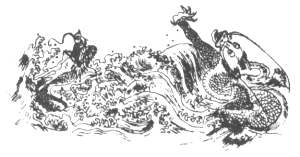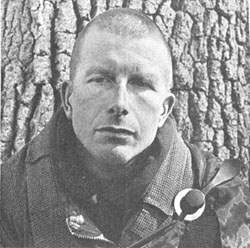|
I understand a little what the Master means when he says, 'I'm
always here, and I always see you.' A great feeling of shame comes over me when
I think of the stupid things I have done, knowing that somehow the Master knows
what I'm doing."
One vivid dream of the Master held premonitions of places
and things to come. Heng Lyou
relates, "In this dream I found myself in a very large house, almost a
palace, and I came upon the Master talking to two people. I arranged my robes
and said, "ding li Shih Fu," (obeisance to the Master). As I started
to bow the Master gently held my head and rubbed me on the crown and told me,
'You'd, better lie on your stomach.' So I lay on my stomach and I felt
many little hands slapping and poking at me. The Master said with some urgency,
'Oh, this English language is just too slow!' and suddenly I was in a vast
flowing golden field gliding around among complex geometric shapes. Then the
scene changed and I was in the Buddha-hall of that grand house, weeping, 'Why is
Shih Fu so good to me? I'm no good, why is he treating me this way, so kindly? I
deserve to be beaten."' The dream occurred in January, and in March, 1977,
while in San Francisco, Heng Lyou accompanied the Master and several other
Sangha members to receive offerings at the home of a donor whose house was
indeed the elegant one he had dreamed about three months before. At another time
following that dream the Master said to Heng Lyou, "I see you crying, you
cry all the time."
Heng Lyou's family has welcomed his life
as a monk as being the most sensible thing he has ever done in his life.
However, Heng Lyou was still plagued by a mean temper and was prone to giving
people a hard time, even after becoming a novice. So when his parents came to
visit his mother perceived his difficulties and said politely, "You're
different, but you haven't changed that much." Her comment shocked Heng
Lyou and caused him to begin examining himself, but his habits were heavy and he
still continued to display anger and manipulate people. Then the retribution
fell. "Three days before the precept platform, the most important day of my
life," relates Heng Lyou, "I was on a ladder that suddenly slipped and
sent me crashing to the hard concrete below. My left foot was nearly crushed at
the ankle and every meridian cried out with pain. A trip to the hospital
revealed no broken bones, but it was obvious that I wouldn't be walking on it
for a long time. The next evening while I sat waiting for evening recitation to
begin, the Master, who had arrived with guests from Los Angeles, came into the
Kuan Yin hall and I got up and called out "ding li Shih Fu." Suddenly
a dream-like scene began, reminiscent of that January dream. As I started that
first bow, the Master hurried over and started whacking me with the whisk he
carried throughout the precept platform. I was really surprised by the first
whack, and as I bowed he whacked and whisked away furiously at my body. When I
finished bowing, I stood awkwardly on one foot as he risked my body from my head
down to my left foot. He told me to sit down to ease my discomfort, and he
continued to whisk away everything into my foot. After some time he kicked my
left ankle, and stepped on my left foot, surprising me even more. He told me to
recite 'Namo Kuan Shih Yin Pu Sa,' and left."
Several months later the Master told Heng
Lyou that it was Dharma Protector Wei T'ou Bodhisattva who had given him a
little tap because he was really fed up with Heng Lyou's behavior. Heng Lyou
states, "I guess my karma is really fierce. The injury caused me tremendous
suffering, but, I realize now, not nearly as much as the victims of my
frustrated rage. At times there seemed to be something very alive in my
foot."
Bhiksu Heng Lyou's lessons and experiences
have been many—too numerous to relate all in detail--but in summing them up he
says, "After all the stupid things I've done, all the ridiculous
attachments I have; after all the upside-down things I've thought about, the
Master compassionately said tome, 'I'll forgive you because you are the dreaming
bhiksu, always dreaming.'"

|

